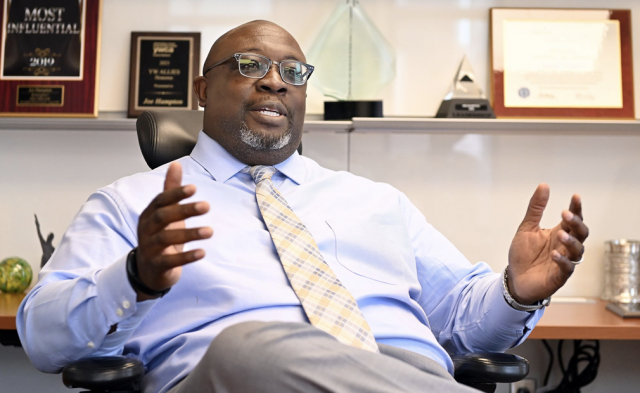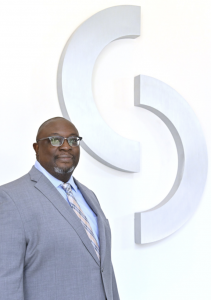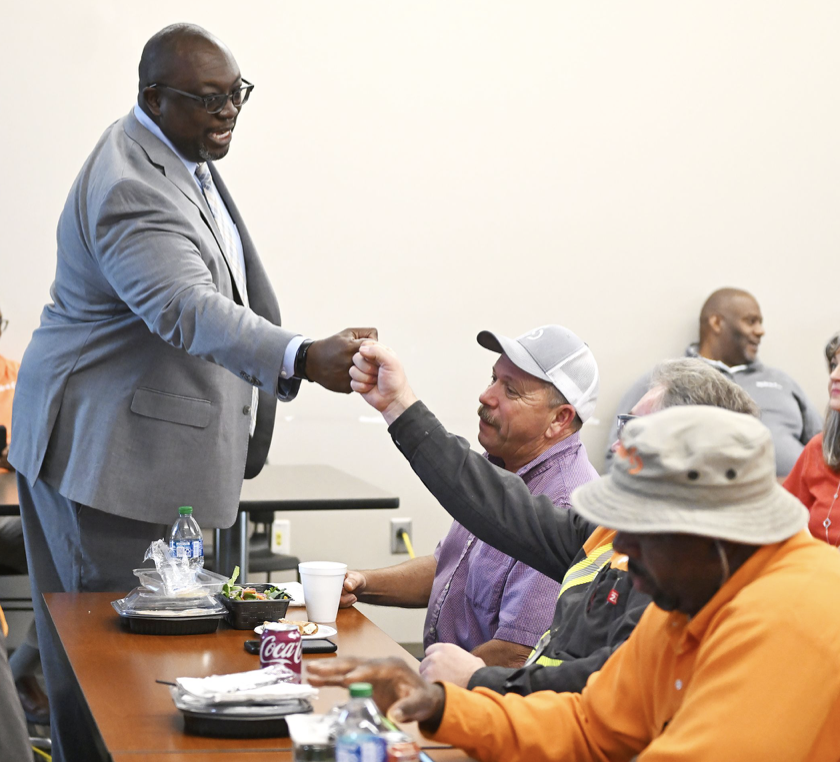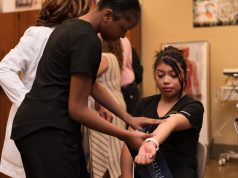
By Nicole S. Daniel
The Birmingham Times
During his senior year at Arthur Harold “A.H.” Parker High School in Birmingham, Joe Hampton remembers being stopped by his counselor after he’d received acceptance letters and scholarships from several schools.
“She said, ‘Joe, get in here,’” said Hampton, recalling the day his counselor asked him to come to her office to introduce him to a recruiter from Stillman College, a historically Black college and university (HBCU) in Tuscaloosa, Alabama. “He was looking at my grades as we were talking, and then he said, ‘We will give you a full scholarship.’”
Hampton, president of Spire Alabama, Gulf Coast, and Mississippi, said the recruiter told him about Stillman’s curriculum for engineering degrees, which included a three-two program: Enroll at Stillman for three years, and earn a physics degree; attend the University of Alabama [UA] for two years, and earn an engineering degree.
Growing up as a UA fan, Hampton, now 48, was sold. He had close family members in Tuscaloosa, and he was only 45 minutes from Birmingham.
“It was a business decision,” he said. “It was either go play football somewhere that probably didn’t have engineering or consider Stillman, pursue engineering, and be close to home. … [By attending Stillman], I could drop dirty laundry off to my mom and go hang out with my buddies.”
Asked why he wanted to pursue engineering, Hampton replied, “My mom would always brag on me at the beauty salon [she worked at in Homewood, Alabama], to other mothers, which at times were embarrassing. One day she had a conversation with a woman who asked what I wanted to do [in the future].
“My mother said, ‘I don’t know,’ but she knew I loved science and was a part of the Southeastern Consortium for Minorities in Engineering [SECME] program. The woman mentioned that her husband worked at an engineering company in Birmingham and that I should connect with someone there to talk about engineering.”

“Not Just an Engineer”
As a result of that hair salon chat, Hampton connected with Wendell Hunt, an engineer with BE&K Engineering who would eventually serve as a mentor. They spoke over the phone and then met a week later during a career day event at A.H. Parker High School.
“Lo and behold, guess who walks in? Wendell Hunt. He spoke to the class about what he does. The only thing I was interested in was the pay,” Hampton laughed. “Afterward, I asked could we talk in the hallway? He became like a big brother. He talked to me about computer engineering and electrical engineering. He finally said, ‘Joe you have to decide that you’re not just an engineer. You have to select the discipline.’
“[Hunt] was very inspirational in helping and guiding me in why [I should pursue] engineering versus another technical background.”
Never Met a Stranger

Hampton arrived on Stillman’s campus in the fall of 1992, and the only people he knew were a few students from Parker who had graduated years ahead of him.
“I’m just like my mom, so I don’t meet strangers,” Hampton said of his mother, who was a longtime hairstylist with a “friendly spirit.”
“I walked up to people and said, ‘Hello, my name is Joe. Who are you?’”
That’s how he quickly became known on campus and found Stillman full of people striving to better themselves and become better educated. Hampton was very active on campus, playing football and joining several social organizations, as well as pledging Omega Psi Phi Fraternity, Incorporated, during his sophomore year.
“I went to every social event that I could show up to and typically tried to be somebody who everybody recognized when I was there,” he said.
In January 1996, Hampton completed his physics requirement and attended the UA to complete his engineering requirements; he completed his UA studies in May 1998.
“You Can Do This”
Hampton described the transition from Stillman to UA as “a shocker.”
“The [UA] in 1996 is not the [UA] that you see today. It has gotten so much larger,” he said. “At Stillman, everybody knew everybody. There were only about 1,000 students. In my physics class, there may have been only six total students. Our professor lived in campus housing, and she would cook dinner and invite the six of us over for additional studying. The professors [at Stillman] were like extended family. They were very inspirational, engaging, and encouraging.
“One day at [UA], I was late because of parking. When I walked into the auditorium, there were about 300 students. I had to sit in the back. While the professor worked the math problem on the board, I just looked at my classmates thinking, ‘This is different.’”
Nonetheless, Hampton learned to persevere in his new environment. He attended UA with three other fellow physics classmates from Stillman. After a month, Hampton’s Stillman classmates quit the program. Hampton considered doing the same—until he called his mentor, Hunt.
“I complained about not knowing people and having to check my grades by looking for the last four digits of my social posted on the professor’s door. That was the only interaction I had with my professor. I didn’t know him, and he didn’t know me. [Hunt] told me, ‘It doesn’t matter if you’re white or Black or where you come from, you have done everything to this point. You can do this!’”
Hunt was right—and in December 2018, Hampton was named president of Spire Alabama, Gulf Coast, and Mississippi.
Asked what words of encouragement he’d share with anyone wanting to pursue engineering and work for a large company, Hampton said, “Be yourself, be open minded to working hard and doing the things others may not want to do; [that will help you] move into places that the next person may not want to move to or take courses you may not be interested in.
“But I think the biggest thing is finding those opportunities, seeking the internship opportunities, and asking yourself, ‘How do I differentiate myself?’ because there are a bunch of smart students out there. My advice would be, ‘don’t wait [for] the internship time to come talk to me about [opportunity], talk about the internship when [you see me]. Tell me you want to work for this organization. Say, ‘Here’s my resume, and I’d love to have some time to meet.’”




